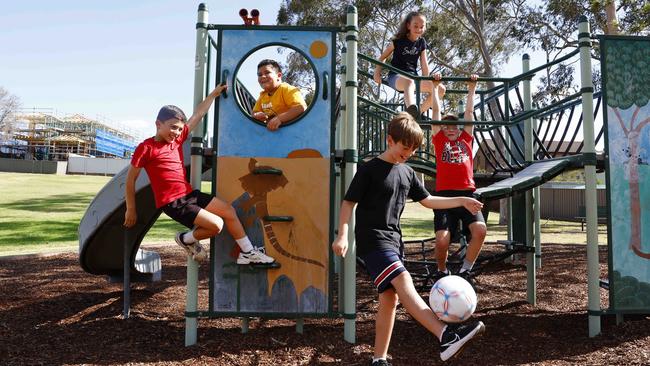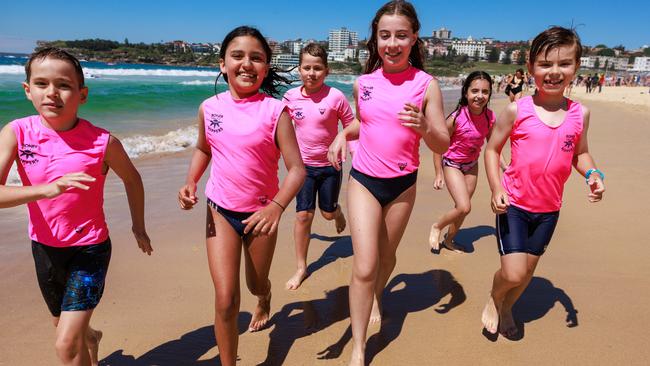Health of the Nation: Top tips to get Aussie kids more active
Half of Aussie kids do less than the recommended 60 minutes of moderate to vigorous physical activity each day. See top tips to help get your children moving more.
Health
Don't miss out on the headlines from Health. Followed categories will be added to My News.
Nearly half of Aussie kids do less than the recommended 60 minutes of moderate to vigorous physical activity each day.
And News Corp’s survey of 3,100 Australians found one in four parents never throw or kick a ball with their children.
Only half take their children outdoors to play one to three hours a week.
To help you get your kids moving more we’ve included some information on national physical activity guidelines and some fun activities to try.
KIDS WOULD RATHER PLAY OUTSIDE
Neighbours Melody Saleh and Zoe Facey don’t have a problem getting their kids to exercise.
If anything the tricky part is getting them home each night from the park that backs on properties.
“When they hear me whistling then all they know is that it’s time to come home,” Ms Saleh said of sons Samuel, 11 and Jakob, 8.
The brothers also keep busy playing junior soccer and rugby league after school and on weekends and when not in the park can be found kicking a ball with their cousin Roman Leaupepe and friends Isaac, 10 and Mila, 8, Facey.
“We’re very lucky to have the park so close so they can be out there everyday,” Ms Facey said.
“They also have screen time each day but at this stage exercise far outweighs their time on the TV/gaming,” she said.

RECOMMENDED EXERCISE FOR KIDS
Primary school aged children need:
• 60 minutes a day of moderate to vigorous physical activity
It doesn’t have to be 1 hour all at once – shorter sessions through the day work too and include football, ball games, bike or scooter riding, swimming, dancing.
• 3 sessions of muscle building activity each week (swinging on monkey bars, push ups, squats, lunges, skipping and jumping).
• Plus several hours of various light physical activities each day including walking to school, walking the dog, going to the park with friends, playing handball.
SKILLS YOUR CHILD SHOULD HAVE
Victoria University exercise expert Dr Aden Kittel said when teaching children new skills start slowly and build up.
“Success oriented activities are important. You want to be giving children tasks that they can do well, and that they can do successfully so they are not discouraged.
For example when catching and throwing, start off over a small distance, practice and provide feedback. He recommends YouTube videos such as Kiddo and Prime Coaching Sport.
BOYS INCREASE THEIR GOALS AND ACHIEVEMENTS FASTER THAN GIRLS
One of Owen Harvey’s favourite things to do in life is to run.
At just age nine, he is already in his second year of a Nippers Junior program at his local beach.
“You get to have fun and enjoy yourself,” Owen said.
Surf Life Saving’s Nippers program is aimed at children aged from 5, which not only encourages them to keep fit but learn lifesaving water skills.
“Nippers also provides the opportunity to become part of a wonderful community while developing life saving skills,” Ms Harvey said.
With exercise being an important daily routine for the Harvey family, Owen’s mother Belinda Harvey said her son enjoys using his smartwatch to track his fitness goals and “loves it when he hits his step or exercise goals for the day”.

“I like getting to know how much I do and what time it is,” Owen said.
Researchers from the University of Sydney looked at children aged 10 to 12 years old from two Sydney schools who were fitted with wrist-worn activity trackers.
Over five weeks, the students were encouraged to increase their level of “huff and puff” exercises.
The study focused on setting physical activity goals and taught the kids how to track their progress through an online health education and behaviour change app.
It found boys increased their goals and achievements faster than girls.
“The kids found time,” University of Sydney physiology expert Professor Corrine Caillaud said.
“It was most often in short bouts of physical activity and that’s completely fine. It doesn’t need to be the 60 minutes in a row. If the activity is shorter and more intense that’s actually even better to trigger heart rates and it will have stronger impact on muscle strength.”
HOW MUCH SLEEP DOES YOUR CHILD NEED
• Sleep is essential to healthy growth
• Children need a regular bedtime and wake up time
• Avoid screen time one hour before bed and keep screens out of bedrooms.
• Children aged 5 to 13 years need 9-11 hours of uninterrupted sleep.
HEALTH CHECKS MY CHILD MAY NEED
*Your child should have a newborn hearing test as part of state and territory screening programs
*if you are worried about your child’s hearing talk to your GP and get them retested
*see an optometrist before your child starts school and every 2 years after that particularly if they blink and squint a lot or complain of headaches and blurry vision
WHAT VACCINATIONS DOES MY CHILD NEED?
• Annual flu jab
• Covid-19 jab is recommended for all children aged 5–11 years.
The recommended schedule is 2 doses, 8 weeks apart. An additional (3rd) primary dose is recommended for severely immunocompromised children, which should be given 8 weeks after the second dose. A booster dose can be considered for children aged 5–11 years who have medical comorbidities that increase their risk of severe Covid-19 or disability with significant or complex health needs, and whose last Covid-19 vaccine dose was 6 months ago or longer.
Originally published as Health of the Nation: Top tips to get Aussie kids more active


